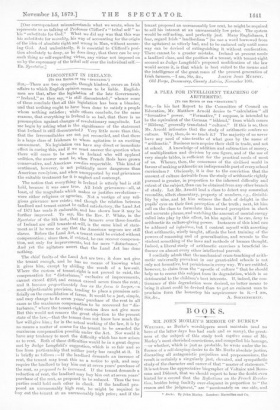DISCONTENT IN IRELAND.
[To THE EDITOR OF THR " SPECTATOR.")
'SIR,—There are two opposite, though kindred, errors on Irish affairs to which English opinion seems to be liable. English- men see that, after the legislation of the late Government, Ireland," as they say, "is still discontented ;" whence some of them conclude that all this legislation has been a blunder, and that nothing ought to have been done to satisfy a people whom nothing satisfies ; while others conclude, for the same reasons, that everything in Ireland is so bad, that there is no presumption against changes of revolutionary magnitude. Let me begin by asking what is the significance of the statement that Ireland is still discontented ? Very little more than this, that the Irreconcilables are not yet reconciled, and that there is a large class of Irishmen to whom agitation is an exciting amusement. No legislation can have any direct or immediate -effect in curing this, and if we must answer the question when there will cease to be mobs in Ireland who will applaud sedition, the answer must be, when French Reds have grown 'conservative, and American rowdies respectable. This kind of 'sentiment, however, is not politically more dangerous than American rowdyism, and when unsupported by real grievances
• i the suitable treatment for it s neglect and contempt.
The notion that everything in Ireland is utterly bad is still held, because it was once true. All Irish grievances—all, at least, of the magnitude which. makes or justifies revolutions— were either religious or agrarian. Not a vestige of any reli- gious grievance now exists ; and though the relation between 'landlord and tenant cannot be called satisfactory, the Laud Act of 1871 has made it endurable, and has shown how it may he further improved. To say, like the Rev. P. White, in the Spectator of the 8th inst., that the farmers over three-fourths of Ireland are still tenants-at-will, is the same kind of state- -ment as if he were to say that the American negroes are still 'slaves. Before the Land Act, atenant could be evicted without 'compensation ; since then, it evicted, he can recover compensa- tion, not only for improvements, but for mere "disturbance." And yet the agitators assert that the Land Act has done -nothing.
The chief faults of the Land Act are two ; it does not give the tenant enough, and he has no means of knowing what it gives him, except by abiding the result of a law-suit. Mere the custom of tenant-right is not proved to exist, the compensation for "disturbance," exclusive of improvements, cannot exceed 2250, and cannot exceed seven times the rent ; and it becomes proportionately less as the farm is larger,—a most objectionable provision, tending to place a premium arti- ficially on the consolidation of farms. It would be a just, simple, and easy change to fix seven years' purchase of the rent in all eases as the maximum compensation to be recovered for "dis- turbance," where the tenant-tiglkt custom does not give more But this would uot remove the great objection to the present state of the law,—that the tenant does not know how much the law will give him ; for in the actual working of the law, it is by no means a matter of course for the tenant to he awarded the maximum compensation possible under the Act. Nor would it have any tendency to meet the difficulty which has now arisen as to rent. Both of these difficulties would be in a great degree met by Judge Longfield's suggestion, which is so fair aud so free from partisanship that neither party has caught at it. It is briefly as follows —If the landlord demands an increase of rent, the tenant may treat this as a notice to quit, and may require the landlord to buy him out at seven years' purchase of the rent, as proposed to be increased. If the tenant demands a reduction of rent, the landlord may buy him out at seven years' purchase of the rent, as proposed to be reduced. Thus the two parties could hold each other in check. If the landlord pro- posed an unreasonably high rent, he might be required to buy out the tenant at an unreasonably high price; and if the
tenant proposed an unreasonably low rent, he might be required to sell his interest at an unreasonably low price. The system would be self-acting, and perfectly just. Many Englishmen, I fear, regard Irish " landlordism " (to use a word borrowed from the agitators) as utterly bad, and to be endured only until some way can be devised of extinguishing it without confiscation. There cannot be a greater mistake. Ireland at present needs a landlord class, and the position of a tenant, with tenant-right secured as Judge Longfield's proposed modification of the law would secure it, is that which is best suited to the means and the intelligence of the great mass of the present generation of


































 Previous page
Previous page